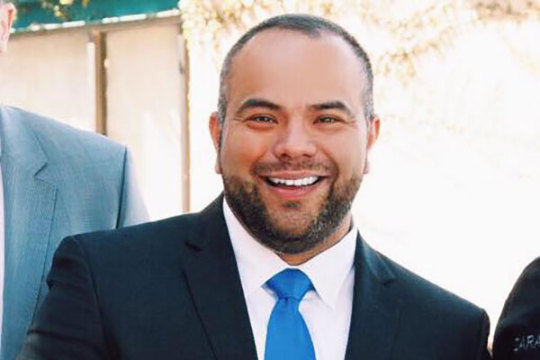
Candidate campaign page: http://velaforassembly.com/
Despite the endorsement of anti-Vision Zero Councilmember Gil Cedillo, David Vela offered a well-rounded and encouraging platform on safe streets in his response to Bike The Vote L.A., including commitments to expanding bike share, Vision Zero, equitable transportation funding, and adoption of an ‘Idaho Stop’ law in California.
Bike The Vote L.A. 2017 Primary Grade: B+
(See below for full candidate questionnaire response)
1. What future do you see for active mobility, and public transit in the daily lives of Angelenos, particularly those who lack access to cars and rely on these other modes as their primary way of getting around?
Improving L.A. County’s public transportation system is one of the most important ways to improve the lives of the working class communities I hope to represent. While the Metro expansion ensured by Measure M is a tremendous step in the right direction, District 51 still will need an efficient system of public transportation that grants people a reasonable alternative to driving. This underlies the urgent need to create safe, accessible, reliable, and most importantly, affordable means of public transportation to everyone in District 51. Prioritizing pedestrians, bikers, and public transit development can tackle the outrageous traffic conditions that Angelenos suffer through on a daily basis.
2. Do you support Vision Zero, an approach to street safety that treats each fatality as preventable and seeks to eliminate traffic deaths on public roads?
Yes. I wholeheartedly support the Mobility Plan’s goal of zero traffic deaths by 2035. Safety is of the utmost priority. While District 51 has some of the best communities in terms of quality of living, we at the same time have some of the busiest intersections in LA that are frequented heavily by traffic and susceptible to potential fatalities. By building complete streets in District 51 that are accessible to pedestrians and bikers instead of cars exclusively, we are one step closer to achieving Vision Zero’s primary objective. It is my duty to work tirelessly with members of the Assembly and the city’s transportation agency to ensure a safer traffic environment for all in District 51.
3. In Los Angeles, low-income communities of color are disproportionately burdened by the impacts of streets designed primarily for cars, without receiving proportional funding for their mobility modes like walking, biking, and quality mass transit. Would you support legislation to add a ‘complete streets’ policy to SB 1, California’s newly augmented gas tax, to direct revenues to projects and programs that benefit pedestrians, bicyclists and transit-dependent communities?
Absolutely. My overriding transportation goal for AD51 is to provide sustainable transportation alternatives that deviate from the dependency on cars. The way to do so is to create incentives to construct the facilities that would encourage more pedestrians and bicyclists on the road. Directing revenues from the new gas tax would help accelerate our goals of ensuring complete streets for all members of District 51.
4. In 2017, Assembly Members Phil Ting (D-San Francisco) and Jay Obernolte (R-Hesperia) introduced AB1103, a bill to enact an “Idaho Stop” adjustment to traffic code that allows cyclists to safely yield right of way at stop signs. This bill would help to reduce subjective traffic stops by law enforcement for a practice that is common by people on bikes and was endorsed by the L.A. Times Editorial Board. Will you commit to support an “Idaho Stop” bill that allows people on bikes to safely yield at stop signs as it comes up in the 2018 legislative session?
Yes, I am committed to the “Idaho Stop” bill because it will ensure two fundamentals: first, it protects bicyclists from potential accidents by maximizing not just their safety, but also the safety of the driver. Second, this legislation will improve traffic inefficiencies by avoiding severe miscommunication between cyclists and drivers, especially during times of a busy traffic climate. This etiquette may already be common to some, but it is yet to appear in the law.
5. Would you support expanding state funding for bike share, and providing incentives for low-income individuals to afford high quality, family-friendly bikes that empower more economical mobility such as electric bikes and cargo bikes?
Yes, certainly. A healthier environment is clearly the desired side effect of promoting green transportation. I will also look at State ATP grants to ensure these goals are met. My goal is to ensure that the opportunity to travel in a safer and healthier manner is enjoyed by not just the wealthy, but all. In the Assembly, I’ll fight to provide the necessary incentives so that working class communities share the benefits of our green transportation reforms.
